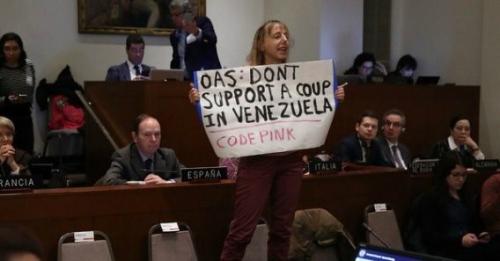Venezuela continues to resist US aggression
In spite of having mobilized the so-called Lima group in Latin America and Western European countries, Washington failed in their attempts to break the resistance of the Bolivarian government.
- Opinión

Venezuela won the diplomatic battle in the face of the US. In spite of having mobilized the so-called Lima group in Latin America and Western European countries, Washington failed in their attempts to break the resistance of the Bolivarian government. With the exception of the governments mentioned above, the rest of the world supports peace and dialogue and rejects the aggressiveness of the United States. Venezuela can counts on allies on the world stage of a significant weight. Even Pope Francis made a plea for peace and dialogue to avoid “unnecessary bloodshed”.
Everything indicates that on the internal front, President Maduro has won the match. In the first place, he has the capacity to mobilize majority sectors of the country in defence of the Bolivarian revolution. Secondly, the armed forces continue to be a central part of the policies of transformation that Venezuela has programmed since Hugo Chávez won the first popular election in 1998. Thirdly, although the US swore in an “interim president” this does not represent a threat to the institutions of the country. In addition, the “president” imposed by Washington does not have significant support in the Assembly of Deputies or in the opposition parties.
While Caracas is sustained by three solid pillars (the people, the Armed Forces and the institutions), the president of the United States Donald Trump has two powerful cards that his is moving together with his allies. The first is the economy. They have expropriated all Venezuelan properties in the US and the oil exports destined for the US market. Nearly 70 per cent of the Venezuelan “black gold” that is exported is to the United States. In addition, this represents over 80 per cent of foreign currency in the Venezuelan economy.
In spite of the US blockade and the sabotage by Venezuelan distribution enterprises, the government has managed to distribute imported consumption goods to the population. With this measure, Venezuela has to seek other markets for its petroleum. On the horizon is China, the biggest consumer on a world scale. Changing one market for another takes time and is not free of complications. Even more problematic is the replacement of consumer goods that Venezuela imports from the US. This is not only an economic matter. It is immersed in a culture that, over the past 70 years – or a little more –, has been replacing local production for imports (from wheat flour and brand clothing to construction materials). The intention of the US is, on one hand, to break the Venezuelan economy, and on the other, to break the resistance of the people. Venezuela does not have a tradition of commercial relations with Latin America. With the exception of Cuba and somewhat less Mexico, the rest of the region depends on its foreign trade with the United States and Western Europe (the not so ancient imperial powers). The countries of the Lima group (mainly Brazil, Argentina, Peru and Chile) have become, in the past 25 years, agro-mining exporters to China.
What is keeping the world on edge (literally) are the repeated threats of the US to militarily invade Venezuela. Washington is employing the same strategy that was successfully applied in Libya, Afghanistan, Iraq and that failed in Syria. First of all, they isolate the countries declared as “threats to their national security”, next they establish a pseudo platform with other subordinate countries and then they launch a “total war”. That is to say, destroy cities, villages and any identified resistance. In Libya, they were successful and today there are no institutions in that country. In Afghanistan, they failed and the Taliban (“Students of the Coran”) continue to resist. In Iraq, the Islamic State appeared (Sunnites with financial support from Saudi Arabia) who have created political chaos in that region.
There are news reports that the United States has troops in Colombia prepared to invade Venezuela. In the face of this scenario, there are three possible outcomes: the first, that the experience of the Bay of Pigs (Cuba) is repeated and that the invasion fails. The second, that the destruction caused by bombardments from the US and by indiscriminate repression causes the people and institutions to cave in (as happened in Chile in 1973 and Panama in 1989). The third, that the people resist, as happened with Bolivar until the Venezuelans expelled the empire of those times. We all want peace rather than war. It is necessary to respect the declaration through which Latin America has been proclaimed a zone of peace.
31 de enero de 2019.
(Translated for ALAI by Jordan Bishop)
- Marco A. Gandásegui, Jr. Is a professor of Sociology at the University of Panama and researcher associated with the Centro de Estudios Latinoamericanos Justo Arosemena (CELA)
http://marcogandasegui2017.blogspot.com/
Del mismo autor
- La pandemia no es el fin del capitalismo 23/04/2020
- Hay que masificar las pruebas contra un virus clasista 19/04/2020
- ¡Qué falta hacen los Comités de Salud de J. Renán Esquivel! 09/04/2020
- La desigualdad social y la desconfianza contribuyen a la epidemia 02/04/2020
- Hacen falta más ‘pruebas’ para ‘suprimir’ el coronavirus 26/03/2020
- La crisis del capitalismo y el coronavirus 19/03/2020
- Urge una movilización general para atacar el corona-virus 12/03/2020
- Se necesita liderazgo y transparencia para enfrentar el corona-virus 05/03/2020
- EEUU veta relaciones entre Panamá y China 27/02/2020
- Roberto Arosemena, sus ideas perduran y sus luchas continúan 20/02/2020
